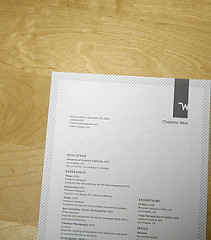While managing the mentoring program for the New York Circle of Translators, I’ve had the chance to come up with some basic advice for translators. Of course, before you start out, you need to be confident that you can translate accurately and know your source language and target language thoroughly. My advice for translators here does not focus on ways to become proficient at translation or whether it’s the right career for you (for these topics, see Sarah Lindholm’s discussion on her blog or visit Corinne McKay’s website, Thoughts on Translation). I also won’t address working as a literary translator (though it may be a topic for a future post). In this post, I’m going to discuss things to do once you have the training you need and you’re ready to work as a freelance translator either part- or full-time.

1. Join the American Translators Association (ATA). It has great resources and advice for translators, and membership shows that you’re serious about your profession. There is also a members’ directory where people may find you and hire you to do a translation. The annual conference is a great opportunity to learn more about the craft of translation and the translation industry and to make valuable connections.
2. Join a local translators association if there is one near you. The ATA has a list of local chapters on its website. The face-to-face contacts you’ll make here can be very valuable. Try to attend as many meetings as you can. If there’s a panel on patent translation, for instance, and you don’t work in this area, go anyway! It can still be helpful to hear about the speakers’ career paths, it gives you a more thorough understanding of the industry, and you may make useful connections with other translators.
3. Join an online translation community where translation jobs are posted. In my experience, ProZ.com is the best one. It also has advice for translators through forums with terminology advice and tips on computer assisted translation (CAT) tools.

4. Spend lots of time crafting your résumé. Have someone look it over for typos you may not have caught. If you need advice on your résumé, ask a fellow translator. Every industry has its own standards, and someone in another field won’t have a good sense of what a translator’s résumé should look like. You can usually find examples online (many ProZ.com users post theirs in their profile) if you need to get a sense of appropriate layout and wording.
5. Don’t turn down small jobs. No job is too small when you’re starting out. Diplomas and certificates are often a beginning translator’s bread and butter. If you’re reliable when completing these jobs, agencies may send you bigger jobs in the future. Keep glossaries or running notes on any difficulties in these projects in case similar things come up again. For instance, you may find an abbreviation in a marriage certificate from Morocco that requires research, and when you get another from the same country, you’ll save yourself a lot of time if you’ve noted down what you discovered.

6. Be ready to develop more than one translation specialty. It’s rare to find a translator who works exclusively in one area (and anyone who does probably only became so specialized after years of experience).
7. Develop good relationships with translation agencies. There is lots of talk in the industry about direct clients these days, but the fact remains that most translators get most of their work from LSPs (language service providers). An agency that pays you on time and has friendly, responsive PMs (project managers) is worth its weight in gold. When you find an agency like this, try to say yes to all the projects it sends you that are within your abilities. Make an effort to establish a personal connection with the PMs who send you work. Wish them a good week, or ask them how their weekend was. It feels much better on both sides when the work relationship is not so impersonal!

8. Be honest about what you can’t do. This is key advice for translators who are starting out: never accept a job without looking over the text first, and assess realistically whether you can do it or not. Keep track of how long it takes you to complete various types of jobs, so you can judge whether they make sense for you financially or not (assuming you are charging on a per-source word basis, which is generally standard).
9. Don’t choose a business name (yet). I have met a lot of beginning translators who have not yet done any paid translation work but already have a business card with a snazzy company name on it. My advice for translators: do print up business cards, and do consider your freelance work a business, but avoid creating a business name when you are just starting out. Here’s why:
- A business needs a professional website and a marketing department (with a budget), but as a beginning translator, you need to devote your time to finding clients, polishing your skills, and TRANSLATING. Unless you’re going all in, a business name alone is not going to project a professional image for potential clients. Does an email address like portuguesetranslationprofessionals@yahoo.com really create the impression of an established company?
- You may change your focus as you progress in your career. So if you choose to call yourself “German Medical Translation Experts,” and then find that most of your work is actually in the pharmaceutical field, you may wish you had waited before choosing a company name.
- It’s simply not necessary to work under any name other than your own. Many of the most accomplished translators I know are “one-person” shops doing one thing. Experience, skills, and reliability are the things that set good translators apart.
10. Always improve your skills. Attend conferences, make glossaries, read in your source language…there are many ways to ensure continuous development of your language skills.
Do you think there’s anything I’ve left out? Feel free to weigh in with a comment!
Kate Deimling has over 10 years’ experience as a French-to-English translator and specializes in marketing & advertising, art & culture, international development, and fiction & non-fiction. She holds a Ph.D. in French from Columbia University and is the managing member of Pen and Ink Art Translations. Kate is an ATA-certified French-to-English translator and directs the mentoring program of the New York Circle of Translators. She has translated five books on topics ranging from the French wine industry to Renaissance portraiture. When she’s not translating, she enjoys reading, soccer, cooking, and spending time with her family. You can reach her at kate@katedeimling.com.


